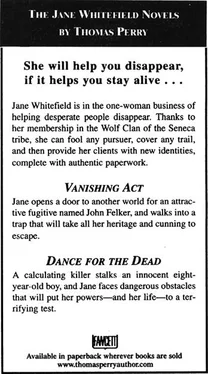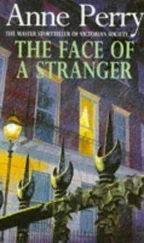She tried to close her eyes and cover her face, but it didn’t change anything. She could still see him clearly, the red shirt getting tinier and tinier as he fell, turning slowly until his face stayed down and he had to watch the surface of the water rushing up at him. There was a little white splash, but the current moved so fast here that before it disappeared it was downstream.
She clung to the girder, closed her eyes, and sobbed in anguish. Then she heard the soft, kind voice. “You have to get up, Janie.”
She looked along the arch, and she could see her mother standing on the narrow steel a few feet from her face. She was wearing a blue silk dress Jane remembered, which her husband had picked out to match her eyes. “I loved him,” Jane said. “I love you both so much.”
“We’ve lost him. He’s not coming back.” Her mother waited expectantly. Jane bent her knees, held her arms out from her sides like a tightrope walker, and stood. The wind seemed perverse now. It came in gusts, so she had to lean into it to stay upright, and then it would stop and she would almost fall.
Her mother’s blue dress was flapping in the wind, but she turned around in a slow circle, looking off at the horizon.
“What am I doing up here?” asked Jane. “Was there something I could have done?”
Her mother looked at her, puzzled. “You mean so he wouldn’t have gone up? Not ask for a new pair of shoes, or eat less food?”
“I don’t know …”
“Everything that happens matters, but we don’t know how.” Her mother stared down the river toward the falls. “You can’t break ground within a hundred miles of here without hitting bone.” She looked at Jane with deep sadness. “Every single one of them loved somebody so much that when they closed their eyes at night they would think of something they forgot to do for them today, or something funny they wanted to tell them tomorrow.”
“Don’t.”
“Men, women, children,” she persisted. “In the Old Time when a baby died, the mother would bury him next to a trail. She thought maybe when some other woman came up the path to work the cornfields, his soul would go into her body so he would get another chance—not so she would have him for herself, but maybe some other woman would get him, who wouldn’t make whatever mistake she had made.”
Jane was frustrated, miserable. She wanted her mother to stop, but she was trying to tell her something. “That’s it, isn’t it—I made a mistake? What is it?”
Suddenly the shadow passed over her mother, then over Jane. She looked up. The crane was swinging the girder out over the water again. There was another man standing on it. She looked at her mother again.
She could see that her mother was anxious, almost afraid to answer her. “It’s the brothers doing this. The world they beat out between them is a battlefield, and the fight doesn’t stop. You don’t get to fuss around for months, watching and poking around while your enemies are busy.”
Jane watched the steel I-beam rise into the sky. The man waved his arm, but this time he was waving at her. She felt her heart stop. It was Carey. “No!” she screamed.
“If you want him, you have to go up there yourself.”
She froze. “That’s the price?”
Her mother spoke quietly. “That’s always the price. That’s how the brothers play. They won’t stop until somebody loses everything.”
She stared at her mother. “But I don’t know enough yet. I know a name—Brian Vaughn. I don’t know what he’s running from, or who is hunting him.”
“You know something just as good.”
“What?”
“You know people who will hunt anybody.” She stopped and watched Jane. “People who are hunting you.”
Jane stood on the arch of the bridge as Carey rose higher and higher. The crane operator made some move that was a little faster than he had intended, and the girder began to swing away. It reached the end of its swing, then began to come back. It moved closer, closer, and Jane knew she would have just one chance. As it stopped, ready to swing away again forever, she jumped for it. She felt herself falling faster and faster, the wind tugging at her hair, the water rushing up at her, and then she woke, lying on the bed in the dark room.
35
When Alvin Jardine saw her he happened to have his head back to drink the last sweet, muddy residue of sugary coffee at the bottom of his cup. He took in a breath and nearly choked. She was coming off a flight from San Francisco and her eyes scanned the way their eyes always did, then snapped straight ahead. Jardine shut his briefcase and stood to turn away while she passed, then decided that the briefcase might be a problem. He pushed it into a rental locker, dropped the quarters into the slot, and took the key. He didn’t need a Wanted poster or printed circular to remember that face. There was nothing in print on her anyway, and he knew he didn’t want to get close to her encumbered by baggage. He quickly walked to the big open portal toward the concourse.
This was just another piece of evidence to prove that life presented prizes that were better than anything anybody could wish for. Here he was, waiting for any one of two dozen small-time bail jumpers and parole violators to step off a plane and into his custody, when in walks a trophy as rare as the last damned whooping crane. And here is Al Jardine, one of probably twenty bounty hunters in the whole world who would have known what he was looking at or had the slightest idea what to do with it.
He watched her from two hundred feet back as he followed her down the crowded concourse. She still had that long black hair, and the rest of her was exactly the way he remembered—legs that looked as though they went on and on. They reminded him of the tricky nature of the task ahead. She was not entirely defenseless. He remembered that very clearly from the one time when he had happened to see her work.
Jardine had been waiting at the Los Angeles County lockup on Vignes Street, watching the door that opened once each day to emit a few prisoners. A man named Hayward was due to be released any day, and Jardine had a fairly strong opinion that he had been jailed and served ninety days under a name that was not his own. It was Jardine’s theory that Hayward had spent most of his life as Bobby McKay.
McKay was worth fifty thousand dollars to an armored-car company. He was also reputed to be big, violent, and uncomfortable without the weight of a pistol somewhere on his person. The best way in the world to take a man like that was at the jailhouse door. He couldn’t be armed and had no chance to prepare. If he proved to be too much for Jardine, then the sight of Jardine getting pounded into the sidewalk would bring cops from inside.
The steel door opened and the gate was sliding out of the way. That day’s excretion of rehabilitated citizenry was already streaming out into the sunshine. The sparse group of friends and relatives were pushing forward to meet them when Jardine became aware that a car had pulled up behind him. He turned and saw the tall, thin woman with black hair come around the car and open the passenger door. He saw a small, frail-looking woman with stringy blond hair separate from the rest and step toward the car, and he felt better, because that assured him the car wasn’t there for Hayward.
There was a sound that set Jardine on edge. It wasn’t loud—just the sound of feet moving fast on the concrete—but anything sudden or unexpected was out of place here.
Jardine had turned his head just in time to see a tall man in a suit arrive at the car and lean forward to lunge past the woman with long black hair to make a grab for the little blond woman in the seat. But the woman with the long black hair had heard him coming. Her elbow caught his face, and Jardine could still bring back the sound of it. He wasn’t sure if it had been the crack of some facial bone breaking, or if the blow had just clapped the man’s jaws together so the teeth clicked. But his head jerked sideways and his body reeled in approximately the direction she had sent his head. She spun counterclockwise. Jardine’s eye had taken it as a quick pivot to begin a retreat around the front of the car to the driver’s seat before the man could collect himself. It was more. As she turned, she was leaning her weight on the hood, swinging her right leg way too high. Her kick clothes-lined the man at about eye level, dropped him onto his back, and followed through. The momentum helped her roll over the hood of the car and land on her feet on the driver’s side. She was inside and accelerating away before Jardine fully appreciated what he had seen.
Читать дальше












